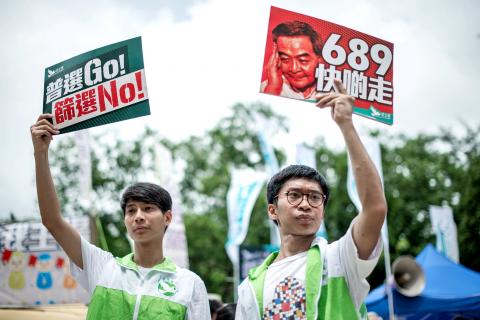Closer cooperation between anti-China activists in Hong Kong and Taiwan is causing “irritation, suspicion and perhaps a bit of paranoia” in Beijing, an article in Foreign Policy magazine’s online edition says.
Pro-democracy activists in both places have concluded only recently that they are facing similar threats from China, says the article posted on Tuesday by Grace Tsoi, a Hong Kong journalist now based in Taipei.
“Hong Kong offers a sobering lesson for Taiwan on the potential dangers of further integration with China,” Tsoi writes.

Photo: AFP
Since Hong Kong was returned from British rule to Chinese sovereignty in 1997, Beijing has asserted informal control through “quiet contacts” with legislators, government administrators and business leaders, she says.
Some Hong Kong business magnates and their children have been appointed members of the Chinese People’s Political Consultative Conference — “an honorary title without real political power, but nevertheless one that smoothes business transactions on the mainland,” she writes.
The Chinese Communist Party has successfully leveraged economic ties with both Hong Kong and Taiwan, but as the “shadow of Beijing grows” more people are “turning their heads, and hearts, away from the mainland,” Tsoi writes.
Hong Kong University of Science and Technology associate professor Sing Ming (成名) is quoted in the article as saying: “As Hong Kong faces increased suppression, it can remind Taiwanese to raise their guard. The growing distance between China and the Taiwanese, in turn, increases the bargaining power of Hong Kong.”
Cooperation between independence movements in Taiwan and Hong Kong could encourage separatists across China to follow suit, “thus threatening to turn the party’s worst nightmare — China’s disintegration — into reality,” Tsoi says.
The Wall Street Journal on Wednesday reported that China was expected to announce on Aug. 31 its decision on how Hong Kong’s leader will be elected.
“At issue is whether Beijing will let Hong Kong residents directly nominate candidates for the chief executive post or whether only pre-approved candidates will be allowed to run,” the newspaper said.
“So far, rhetoric from officials in both Beijing and Hong Kong suggests that Beijing will reject outright activists’ demands,” it added.

Seventy percent of middle and elementary schools now conduct English classes entirely in English, the Ministry of Education said, as it encourages schools nationwide to adopt this practice Minister of Education (MOE) Cheng Ying-yao (鄭英耀) is scheduled to present a report on the government’s bilingual education policy to the Legislative Yuan’s Education and Culture Committee today. The report would outline strategies aimed at expanding access to education, reducing regional disparities and improving talent cultivation. Implementation of bilingual education policies has varied across local governments, occasionally drawing public criticism. For example, some schools have required teachers of non-English subjects to pass English proficiency

‘FORM OF PROTEST’: The German Institute Taipei said it was ‘shocked’ to see Nazi symbolism used in connection with political aims as it condemned the incident Sung Chien-liang (宋建樑), who led efforts to recall Democratic Progressive Party (DPP) Legislator Lee Kun-cheng (李坤城), was released on bail of NT$80,000 yesterday amid an outcry over a Nazi armband he wore to questioning the night before. Sung arrived at the New Taipei City District Prosecutors’ Office for questioning in a recall petition forgery case on Tuesday night wearing a red armband bearing a swastika, carrying a copy of Adolf Hitler’s Mein Kampf and giving a Nazi salute. Sung left the building at 1:15am without the armband and apparently covering the book with a coat. This is a serious international scandal and Chinese

TRADE: The premier pledged safeguards on ‘Made in Taiwan’ labeling, anti-dumping measures and stricter export controls to strengthen its position in trade talks Products labeled “made in Taiwan” must be genuinely made in Taiwan, Premier Cho Jung-tai (卓榮泰) said yesterday, vowing to enforce strict safeguards against “origin laundering” and initiate anti-dumping investigations to prevent China dumping its products in Taiwan. Cho made the remarks in a discussion session with representatives from industries in Kaohsiung. In response to the US government’s recent announcement of “reciprocal” tariffs on its trading partners, President William Lai (賴清德) and Cho last week began a series of consultations with industry leaders nationwide to gather feedback and address concerns. Taiwanese and US officials held a videoconference on Friday evening to discuss the

PERSONAL DATA: The implicated KMT members allegedly compiled their petitions by copying names from party lists without the consent of the people concerned Judicial authorities searched six locations yesterday and questioned six people, including one elderly Chinese Nationalist Party (KMT) member and five KMT Youth League associates, about alleged signature forgery and fraud relating to their recall efforts against two Democratic Progressive Party (DPP) legislators. After launching a probe into alleged signature forgery and related fraud in the KMT’s recall effort, prosecutors received a number of complaints, including about one petition that had 1,748 signatures of voters whose family members said they had already passed away, and also voters who said they did not approve the use of their name, Taipei Deputy Chief Prosecutor